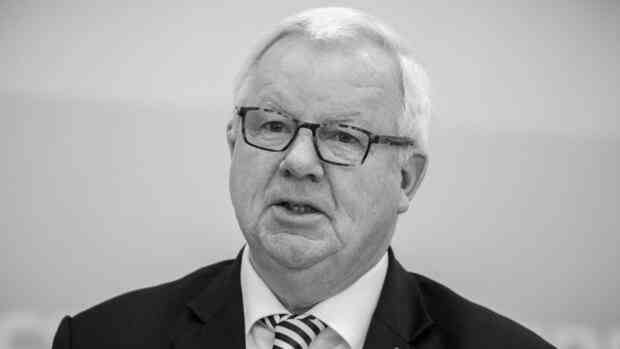The CDU politician sat in the Bundestag from 2002 to 2017 and has been deputy parliamentary group leader since November 2009.
(Photo: dpa)
Berlin Politicians of the CDU do not hand out the title “Mister Economy” without further ado. But Michael Fuchs wore it confidently – even after he left the Bundestag in 2017.
Born in Koblenz, he represented what the CDU stood for for many years and wants to stand for again in the future: the pharmacist, pharmacist and entrepreneur with a doctorate tirelessly fought for medium-sized businesses, the market economy and the price as a guiding instrument.
As an entrepreneur with a subsidiary in Hong Kong, Fuchs was involved in a number of associations, including as President of the Federal Association of German Wholesale and Foreign Trade. His network was considered to be particularly large.
In his 15 years as a member of the Bundestag, including eight years as deputy chairman of the CDU/CSU parliamentary group, he never tired of fighting for affordable energy and warning against a “climate planned economy” and the deindustrialization of Germany.
Top jobs of the day
Find the best jobs now and
be notified by email.
Fuchs was one of those people that a chancellor could rely on – even if he vehemently defended nuclear energy, which Angela Merkel had said goodbye to in the face of a Japanese nuclear accident. “His word was true, there were no compromises,” remembers parliamentary manager Patrick Schnieder.
The cosmopolitan would have liked to become Federal Minister of Economics
Fuchs preferred to criticize behind the scenes. A trait that the chancellor appreciated. However, Fuchs never rose to become Federal Minister of Economics. “I think as a minister I would have tackled some things differently than some incumbents,” he said on his political farewell in 2017.
Fuchs held the flag of the market economy all the higher the longer his party had to form a coalition with the Social Democrats. Finally, even SPD leader Franz Müntefering admitted that his party found it difficult to generate the money with which to guarantee a strong welfare state.
Fuchs fought for a strong economy – which was easier in the coalition with the FDP – and at the same time rejected state aid for companies, both Opel and Air Berlin. He looked at the third grand coalition from afar, but still had the advice: “We have to be careful not to let the state have too much of an impact on the markets.”
“He was a native person and at the same time cosmopolitan,” recalls Julia Klöckner, spokeswoman for economic policy for the Union faction and former state chairwoman of Rhineland-Palatinate. He liked “the argumentative exchange with arguments, but always with decency”.
Merz: “a loyal friend and companion”
He was a hard worker who could also enjoy: the wine from the Moselle and the Middle Rhine as well as “the heavy Italian wines”. Fuchs loved Italy and had a second home in Venice.
>> Read here: Michael Fuchs: “As a minister, I would have tackled things differently”
CDU leader Friedrich Merz, a self-confessed regulatory politician, called Fuchs “a loyal friend and companion”. For many, he was “a fatherly friend and clear regulatory politician,” as the CDU state chief Christian Baldauf called it.
Michael Fuchs died on December 25 at the age of 73. He leaves behind a wife and two children. On January 2, he will say goodbye with a memorial service in his hometown of Koblenz. A service is to be held in his honor on January 26 in Berlin.
More: Government cannot agree on acceleration pact
